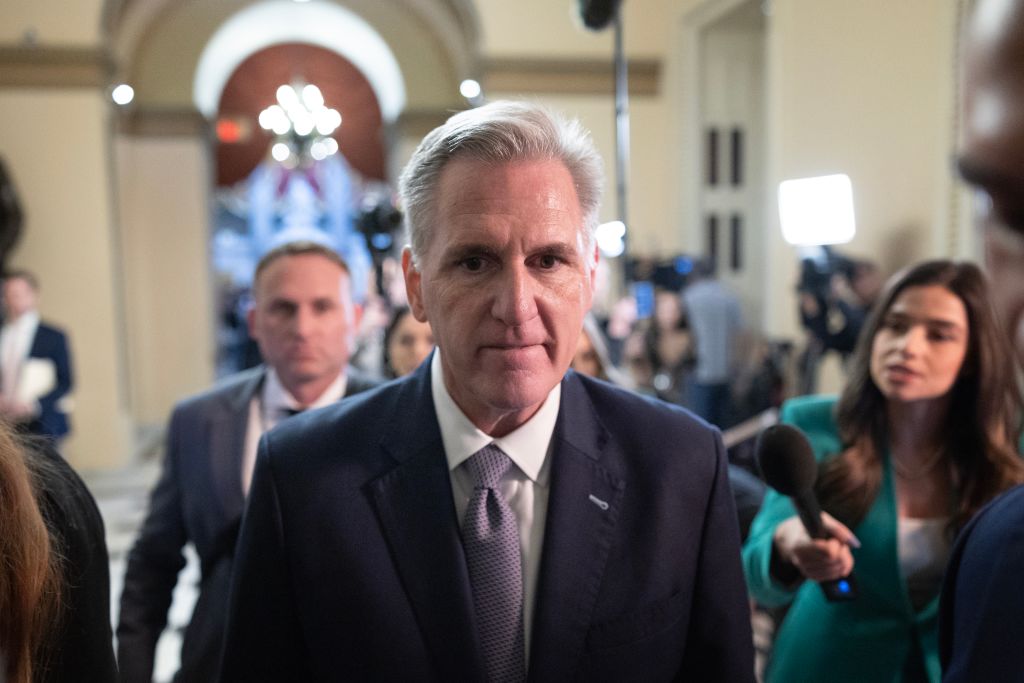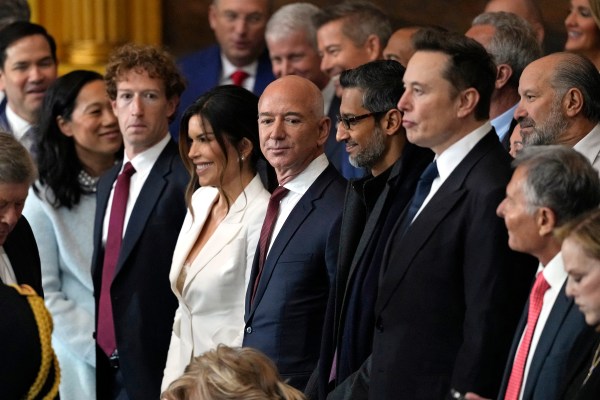As Republican after Republican stood on the House floor to defend then-Speaker Kevin McCarthy against a far-right effort to oust him on Tuesday, Democrats who were listening didn’t hear many arguments for why they should intervene.
Rules Committee Chairman Tom Cole, an Oklahoma Republican, briefly mentioned the health of the institution, and North Carolina Rep. Patrick McHenry started to snidely address Democrats before his time expired. But most of the speeches in McCarthy’s favor were aimed squarely at the small contingent of his Republican critics, attempts to convince inconvincible people to be team players. It was absurd, considering everyone agreed Democrats controlled McCarthy’s fate. And in the hours leading up to the vote, the California Republican publicly declared he wouldn’t consider any agreement with Democrats to save his speakership.
Yet after losing the gavel, McCarthy blamed Democrats for not taking the responsible course. “I think today was a political decision,” he said of their refusal to stop Florida Rep. Matt Gaetz’s motion to vacate. “My fear is the institution fell today.”
McCarthy’s comments about the good of the institution were laughable to Democrats, who had grown more and more resentful of him, particularly after his response to the ransacking of the Capitol on January 6, 2021.
Some Democrats early this week seemed willing to consider helping McCarthy. A few of them expressed concerns Monday about who might replace him if they didn’t stop Gaetz. But Democrats were palpably angry when they gathered Tuesday morning to talk it out. Maryland Rep. Jamie Raskin reminded members of McCarthy’s initial reaction to the January 6 attack, in which he first blamed Trump for inciting the rioters and told his leadership team he would encourage the president to resign. “What he did is unacceptable,” McCarthy told members of Trump at the time. “Nobody can defend that and nobody should defend it.”
Just a couple of weeks later, McCarthy reversed course and made a pilgrimage to Mar-a-Lago to repair his relationship with the former president. Since then—either to preserve his own leadership position or to maintain Trump’s cooperation in campaigning for House Republicans, or both—he has blamed law enforcement failures and former House Speaker Nancy Pelosi for the Capitol complex’s security flaws that day. But he has refused to criticize Trump again.
When The Dispatch asked McCarthy on Tuesday night if he regrets embracing Trump in the aftermath of January 6, he responded like it was unthinkable to have done anything differently. “Oh my God,” he said. “No. But do I regret the Democrats playing games with January 6? Yes.”
“What they did to this institution, what they did to this building was so wrong,” he added, lamenting that Democrats placed magnetometers at House chamber entrances after the attack and blocked Republicans who tried to overturn the election from cosponsoring their bills.
Those comments highlight why Democrats were willing to shiv him. Traditional partisanship—one focused on policy goals, or even McCarthy’s old fashioned fixation on winning elections—wasn’t as offensive to Democrats as his willingness to elevate some of the most destructive voices in American politics to keep his grip on power.
McCarthy has had friendships and jovial camaraderie with lawmakers from both parties since his election to the House in 2006. But to the bitter end, as he sought to hold onto his leadership position, he practiced a politics of grievance and prideful partisanship. A dogged “live by the majority, die by the majority” approach defined his speakership over the past nine months, even as he knew he would need Democratic votes to navigate difficult moments such as the debt ceiling deadline and government funding bills. To win the speakership in the first place, he elevated hardline Republicans to positions of power, allied himself closely with conspiracy mongers and secession-friendly members like Rep. Marjorie Taylor Greene, and changed the rules to make Gaetz’s rebellion possible. And last month, he reversed his belief that an impeachment inquiry should begin with a vote of the full House, not as a unilateral move by the speaker, because it was politically convenient for him.
It’s abundantly clear now that McCarthy’s strategy of appeasement isn’t enough to manage the GOP conference’s right flank. As Republicans try to select a new speaker, the chamber’s math remains the same. The GOP conference still has only a few votes to spare and quite a lot of division to overcome within their ranks. There’s still a government funding deadline coming up, and whoever wins the speakership will have to deal with Democrats to get past it.
Remaining Republican leaders are taking out their frustration on Democrats after Tuesday’s vote, ordering former Democratic leaders Nancy Pelosi and Steny Hoyer to vacate offices they had in the Capitol building. Republicans will hold a candidate forum on Tuesday, followed by a speakership election Wednesday. Members admit whoever wins the job will have to be crazy enough to want it in the first place. And winning the election without the help of Democrats will likely be a challenge, to say the least.
There’s always the far-fetched West Wing version of this scenario in which moderates in both parties choose stability over dysfunction and team up to elect a consensus speaker. Some Republicans worry that with this week’s chaos, the table is set for such an agreement. “I think Matt’s conditions on a speaker are such that they can’t be satisfied without some kind of coalition power structure,” Kentucky Republican Rep. Thomas Massie told The Dispatch of Gaetz this week. And Arizona Rep. David Schweikert said Tuesday night he fears some moderate members will try to reach out to Democrats, and the party coalitions will break down.
For now, it looks unlikely. The Republicans most given to those kinds of fantasies—members of the Problem Solvers Caucus—are threatening to quit the group, angry with Democrats for not stymying Gaetz’s effort. And Democratic lawmakers told The Dispatch they anticipate their party will present a united front in backing their leader, Rep. Hakeem Jeffries, in next week’s speakership election.
“I don’t see that happening, where Democrats participate in electing a Republican speaker,” Rep. Raja Krishnamoorthi said in an interview. He predicted Republicans will install their own speaker, but the two parties may collaborate on rules changes to “make the place governable” and prevent another rebellion.
He pointed to the select committee on competition with the Chinese Communist Party, on which he serves as the top Democrat, as a model for bipartisan cooperation—finding places of agreement and focusing on those.
“There’s such a hunger for it,” he said. “Even though this place doesn’t operate like the West Wing, the reason the West Wing was so popular was people wanted it. They want that.”






Please note that we at The Dispatch hold ourselves, our work, and our commenters to a higher standard than other places on the internet. We welcome comments that foster genuine debate or discussion—including comments critical of us or our work—but responses that include ad hominem attacks on fellow Dispatch members or are intended to stoke fear and anger may be moderated.
With your membership, you only have the ability to comment on The Morning Dispatch articles. Consider upgrading to join the conversation everywhere.